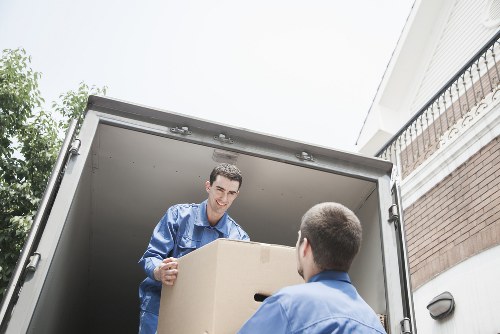Effective Waste Disposal in Slough: A Comprehensive Guide

Waste disposal is a critical aspect of maintaining a clean and healthy environment in Slough. With rapid urbanization and industrial growth, managing waste efficiently has become more important than ever.
Proper waste management not only helps in reducing pollution but also plays a significant role in conserving natural resources. In Slough, various strategies are implemented to ensure that waste disposal is handled responsibly.
Understanding the different types of waste and the appropriate methods for disposal is essential for both residents and businesses.

Types of Waste in Slough
Waste in Slough can be categorized into several types, each requiring specific disposal methods. The main categories include:
- Household Waste
- Industrial Waste
- Hazardous Waste
- Recyclable Materials
Proper classification helps in managing waste more effectively and reduces the environmental impact.
Household waste typically includes everyday items such as food scraps, packaging materials, and non-recyclable plastics.

Waste Disposal Methods
There are several methods used for waste disposal in Slough, each suited to different types of waste.
- Landfilling
- Incineration
- Recycling
- Composting
Landfilling is commonly used for non-recyclable and non-hazardous waste, while recycling is encouraged to reduce landfill use.
Composting is an effective method for managing organic waste, turning it into valuable compost for gardening and agriculture.

Recycling Initiatives in Slough
Slough has implemented several recycling programs to promote sustainable waste management practices. These initiatives include:
- Separate collection of recyclable materials
- Public awareness campaigns
- Incentives for businesses to adopt recycling
- Provision of recycling bins in public areas
These efforts have significantly increased the recycling rate in Slough, contributing to a reduction in overall waste.
Community participation is vital for the success of these recycling programs.

Challenges in Waste Disposal
Despite the progress, Slough faces several challenges in waste disposal:
- Increasing waste generation
- Limited landfill space
- Ensuring proper segregation of waste
- Managing hazardous waste safely
Addressing these challenges requires continuous efforts from both the authorities and the community to implement effective waste management strategies.
Technological advancements and innovative solutions play a crucial role in overcoming these obstacles.
Nearby Areas and Their Waste Disposal Facilities
Slough is surrounded by several areas that contribute to and benefit from its waste disposal infrastructure. Here are some of the closest areas:
- **Langley**: Located just north of Slough, Langley has access to Slough's recycling centers and landfill sites.
- **Maidenhead**: To the west, Maidenhead collaborates with Slough for hazardous waste management.
- **Beaconsfield**: East of Slough, Beaconsfield residents utilize the composting facilities available in Slough.
- **Windsor**: Nearby Windsor benefits from Slough's advanced waste incineration plants.
- **Burnham**: South of Slough, Burnham engages in joint recycling initiatives with Slough.
- **Eton**: Adjacent to Slough, Eton participates in Slough’s community waste reduction programs.
- **Uxbridge**: Northwest of Slough, Uxbridge accesses the same landfill facilities for non-recyclable waste.
- **High Wycombe**: Northeast, High Wycombe collaborates with Slough for industrial waste disposal.
- **Bray**: Southwest of Slough, Bray shares composting resources to manage organic waste.
- **Wexham**: Directly south, Wexham benefits from the comprehensive waste collection services provided by Slough.
Benefits of Proper Waste Disposal
Effective waste disposal in Slough brings numerous benefits, including:
- Reduction in environmental pollution
- Conservation of natural resources
- Creation of green spaces
- Promotion of public health
- Economic advantages through recycling and resource recovery
These benefits highlight the importance of maintaining robust waste management systems in urban areas like Slough.
Community involvement and responsible waste disposal practices are essential to sustain these advantages.
Future of Waste Disposal in Slough
Looking ahead, Slough aims to enhance its waste disposal systems by:
- Implementing advanced recycling technologies
- Expanding composting facilities
- Reducing reliance on landfills
- Encouraging zero-waste initiatives
- Promoting sustainable practices among residents and businesses
These initiatives are part of Slough's commitment to environmental sustainability and responsible waste management.
Continuous improvement and innovation will drive the future of waste disposal in the region.
Conclusion
Waste disposal in Slough is a multifaceted issue that requires coordinated efforts from the community, authorities, and businesses. By understanding the types of waste, adopting effective disposal methods, and participating in recycling initiatives, residents can contribute to a cleaner and healthier environment.
Addressing the challenges and embracing future opportunities will ensure that Slough remains a sustainable and thriving community for years to come.
Frequently Asked Questions
1. What types of waste can be recycled in Slough?
In Slough, recyclable materials include paper, cardboard, plastic containers, glass bottles, and metal cans. Electronic waste and certain textiles can also be recycled through specialized programs.
2. How can I participate in Slough's composting program?
Residents can join Slough's composting program by separating their organic waste and placing it in designated compost bins provided by the local council. Community composting sites are also available for public use.
3. What should I do with hazardous waste in Slough?
Hazardous waste, such as batteries, chemicals, and electronic devices, should be taken to designated hazardous waste collection points in Slough to ensure safe and proper disposal.
4. Are there penalties for improper waste disposal in Slough?
Yes, improper waste disposal in Slough can result in fines and penalties. It is important to follow the local waste management guidelines to avoid any legal consequences.
5. How can businesses in Slough improve their waste management practices?
Businesses can enhance their waste management by implementing recycling programs, reducing waste generation, using eco-friendly materials, and collaborating with local waste disposal services to ensure responsible handling of their waste.